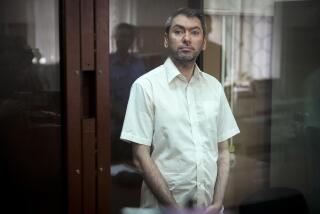Rejected Earlier by Soviets : Sakharov, Reform Slate Win Seats in Parliament
- Share via
MOSCOW — Andrei D. Sakharov, the Soviet nuclear physicist and human rights campaigner, won election on Thursday to the country’s new Parliament at the head of a slate of other prominent reformers, the official Tass news agency reported.
Sakharov, 67, still a leading liberal voice on the Soviet political scene despite his frail health, will now be in a position to join the reformist leadership expected to emerge from the new Congress of People’s Deputies.
The victory also confirms Sakharov’s full political rehabilitation after years of official harassment and internal exile for his unremitting activities in support of human rights.
Once Seen as Traitor
Although awarded the Nobel Peace Prize in 1975, Sakharov was regarded by the past Soviet leadership as virtually a traitor for his criticism of its policies, and he was freed from internal exile and allowed by President Mikhail S. Gorbachev to return to Moscow only in December, 1986.
Elected with Sakharov to represent the prestigious Soviet Academy of Sciences, which will have 20 seats in the 2,250-member congress, were some of the strongest advocates of radical change here.
They included physicist Roald Sagdeyev, former head of the country’s space exploration program; economists Nikolai Shmelev, Nikolai Petrakov and Gennady Lisichkin, authors of some of the most sweeping economic reform proposals under consideration here; political scientist Yuri Karyakin, who has become known for his outspoken, often fiery attacks on conservatives in the country’s leadership, and legal specialist Alexander Yakovlev, who is drafting much of the new reform legislation.
Like Sakharov, most of the winners had been excluded as candidates in the first round of voting at the Academy of Sciences by its conservative leadership, but a full-scale revolt by both senior members of the academy and representatives of rank-and-file scientists forced a second round with a more open nominating procedure.
Although he had been nominated in more than 30 constituencies around the country, Sakharov had declared that he would only accept election from the Academy of Sciences, thus forcing the showdown with conservatives there.
Georgy A. Arbatov, director of the Institute for Study of the U.S.A. and Canada, also won election--with backing from Sakharov and other senior scientists--although he was strongly criticized during the election and before as a supporter of the now criticized policies of the late President Leonid I. Brezhnev.
The results, which will be officially announced later today, confirmed the broad trend in the elections nationwide to make the new Congress of People’s Deputies not only a forum for the broadest exchange of views, itself a major change after years of political conformity here, but also a principal vehicle for sweeping changes.
Legislative Authority
The congress, described in constitutional changes last year as the “highest body of power” in the country, will have overall legislative authority, including the right to make further constitutional changes.
It will also elect a standing legislature, the Supreme Soviet, and the country’s president, expected to be Gorbachev, when it meets on May 25. The Supreme Soviet, for decades a parliamentary rubber stamp for the ruling Communist Party, is to have real authority under Gorbachev’s reforms.
Shmelev, an economist at the U.S.A. Institute and a leading advocate of greater use of market forces in the economy, received the largest number of votes, 869 out of the 1,101 cast, according to Tass. Sakharov received 806 votes and Sagdeyev 739.
More to Read
Sign up for Essential California
The most important California stories and recommendations in your inbox every morning.
You may occasionally receive promotional content from the Los Angeles Times.













